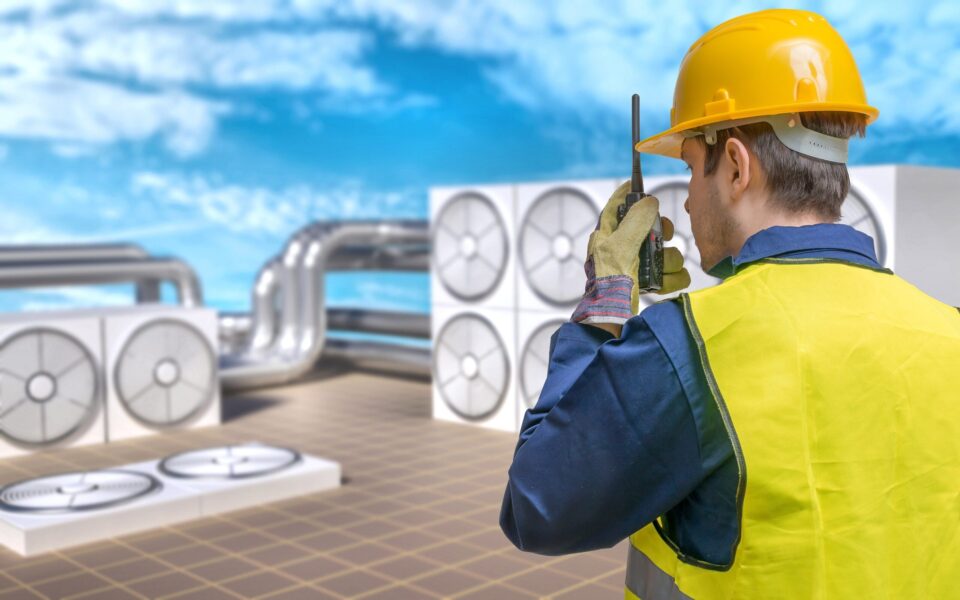Workplace ventilation is responsible for removing contaminants from the air and providing fresh air to breathe. Ventilation helps to regulate temperature and humidity, making the workplace more comfortable. With the spread of COVID-19 occurring via airborne particles and droplets, there are more reasons than ever to ensure your workplace is effectively ventilated.
According to the NSW Government, “open or well-ventilated spaces reduce the risk of transmission of COVID-19”. Workplaces around Australia are encouraged to assess the quality of their indoor ventilation and make practical adjustments to help keep employees safe and help prevent viral transmission. Studies have shown that simple changes to workplace ventilation systems can significantly decrease the transmission of COVID-19 and reduce overall energy consumption.

Poor ventilation in indoor venues and workplaces has been linked to covid clusters. This evidence is backed by the Australian Health Protection Principal Committee (AHPPC) who’ve advised that improved ventilation systems will help limit the spread of respiratory diseases in indoor environments. “Workplaces should ensure ventilation is sufficient to allow COVID-19 particles to be carried away from workers and other occupants, either naturally or through engineered systems.” (Dr. Jessica McInnes, AHPPC spokesperson).
Workplaces around the world have adopted methods to help combat the spread of airborne viral transmission. Opening windows, increasing airflow, flushing and filtering air are ways to maximise ventilation. However, this can lead to an increase in energy consumption, and ventilation running costs whilst compromising thermal comfort.
The City of Melbourne’s BREATH pilot project tested ventilation systems in a vacant building over a three-month period. This project evaluated three different systems including displacement ventilation air conditioning, in-ceiling air filters and natural airflow through open windows. Findings showed that each system helped to reduce the potential transmission of airborne viruses, improving workplace safety.

Displacement ventilation systems supplying fresh air from low levels proved to be the most effective and energy-efficient solution, significantly improving workplace safety by reducing the transmission of airborne viruses by 83% (BREATH pilot). Although this solution is costly to install, there are little to no ongoing maintenance costs.
In-ceiling air filters / filter fans can also help to clean the air and provide fresh air to breathe. The BREATH pilot project saw a 49% reduction in viral transmission by utilising in-ceiling air filters with a slight increase in energy consumption (BREATH pilot).
Opening windows to allow natural airflow and flushing out stale air can also improve workplace ventilation. According to the BREATH pilot, natural airflow can reduce the potential transmission of COVID-19 by 53%. Although this method yielded great results, energy costs increased by up to 20% with seasonal temperature variations. Another downfall to natural airflow and ventilation is the accessibility, as many office buildings don’t have opening windows. Or, the temperature is too extreme to rely on natural airflow whilst maintaining thermal comfort.

Cooling fans are a great way to circulate air, however, a robust ventilation system is ideal to maximise their effectiveness. Without your ventilation system, you are simply just pushing around potentially contaminated air. Exhaust fans, roof fans and even portable extractors can remove contaminated air. This helps ensure that you aren’t breathing in the same air over and over again by supplying sufficient ventilation to keep employees safe.
Ventilation is key to mitigating the spread of Covid, Fanquip offers commercial and industrial site inspections to assess your needs and develop a custom ventilation solution. In addition to our custom ventilation solutions, we also have standardised product options that are available to purchase online.
Making sure your workplace is properly ventilated is one of the easiest and most important ways to make your employees feel appreciated, comfortable and safe. By making simple changes to workplace ventilation, businesses can reduce infectious disease transmission and reduce their carbon footprint.

Speak to Fanquip for an assessment of your workplace. We are specialists in heating, cooling and ventilation and can provide a comprehensive solution for your workplace. From consultation, customised solutions, Australian-made products, and installation, we are here with you all the way through.
